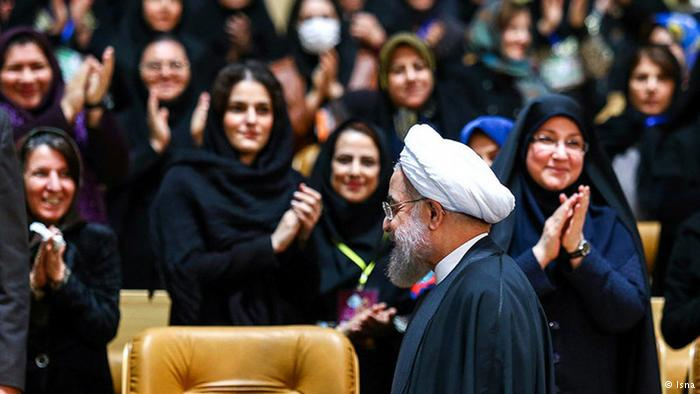Glass Ceiling Remains Intact in Rouhani’s New Cabinet

As Rouhani’s second administration starts work, his voter base seems frustrated, seeing a large portion of its demands unaccounted for. One in many is the disillusionment caused by the failure of a popular campaign aimed to persuade Rouhani to include women in the cabinet. Rouhani has implied that he has done his best. What follows is a recap by Sadra Mohaghegh, published in Shargh Daily.
“I did want to have at least three female ministers. The candidates had been chosen but in vain”. These were parts of the remarks made by Hassan Rouhani, presenting his proposed cabinet ministers to the parliament. Who were the three women Rouhani had nominated as ministers?
Debate about the necessity to appoint female ministers in the 12th administration started the day after election results came out. Some speculations indicated that the new administration would at least include one female minister, particularly since the Ahmadinejad administration had already broken the taboo. Early on and looking back at the Rouhani reelection campaign, analysts, social, political and women’s rights activists came to believe that Hassan Rouhani would only need support and encouragement to alleviate pressure and or opposition, if any.
However, others, including some cabinet members, said Rouhani had no faith in the issue hearing the President’s remarks during an Iftar feast with women and family activists, held five days after the election. “Today, women have become sensitive about their destiny. They are doing good work too, but need to try harder for involvement at managerial levels. Obviously, a woman with no managerial experience cannot be suddenly placed at a managerial position. It should come step by step,” Rouhani said. Rouhani spent the whole all-female Iftar praising women and their management, and the necessity to support their management. However, some observers believed his step-by-step axiom was pouring cold water on advocates of women in high places. Hopes somehow managed to survive before the proposed cabinet was unveiled. Many actively commented on the issue and expressed hope. Media outlets were also carried away, publishing reports and interviews.
It was in mid-June that a reformist female activist told Shargh daily off record that one of two red lines in the new Rouhani administration was to appoint female ministers. That did not kill the hopes, however, and advocates insisted on their demand until some cabinet members came out saying there would be no female ministers. These included outgoing Vice President for Women and Family Affairs Shahindokht Molaverdi, herself one of the most anticipated candidates to land a ministerial job.
She was said to be one of the candidates for the Education Ministry, which she confirmed in an interview with Shargh Daily. In an interview with ANA news agency, Elham Aminzadeh also revealed she had been nominated as Rouhani’s Justice Minister, but the proposition had been rejected. “Apparently, the President’s efforts to do so proved futile,” she said. Massoumeh Ebtekar had also been chosen as the Agriculture Minister.
On Sunday, Majlis gave 16 of Rouhani’s 17 proposed ministers a vote of confidence. With Energy and Higher Education Ministries still waiting for ministers, the prospect of a female minister seems to be gone altogether. That leaves Marzieh Vahid Dastjerdi, Healthcare Minister under the Ahmadinejad administration, the only female minister in the history of the Islamic Republic. Ahmadinejad fired her after three and a half years.

